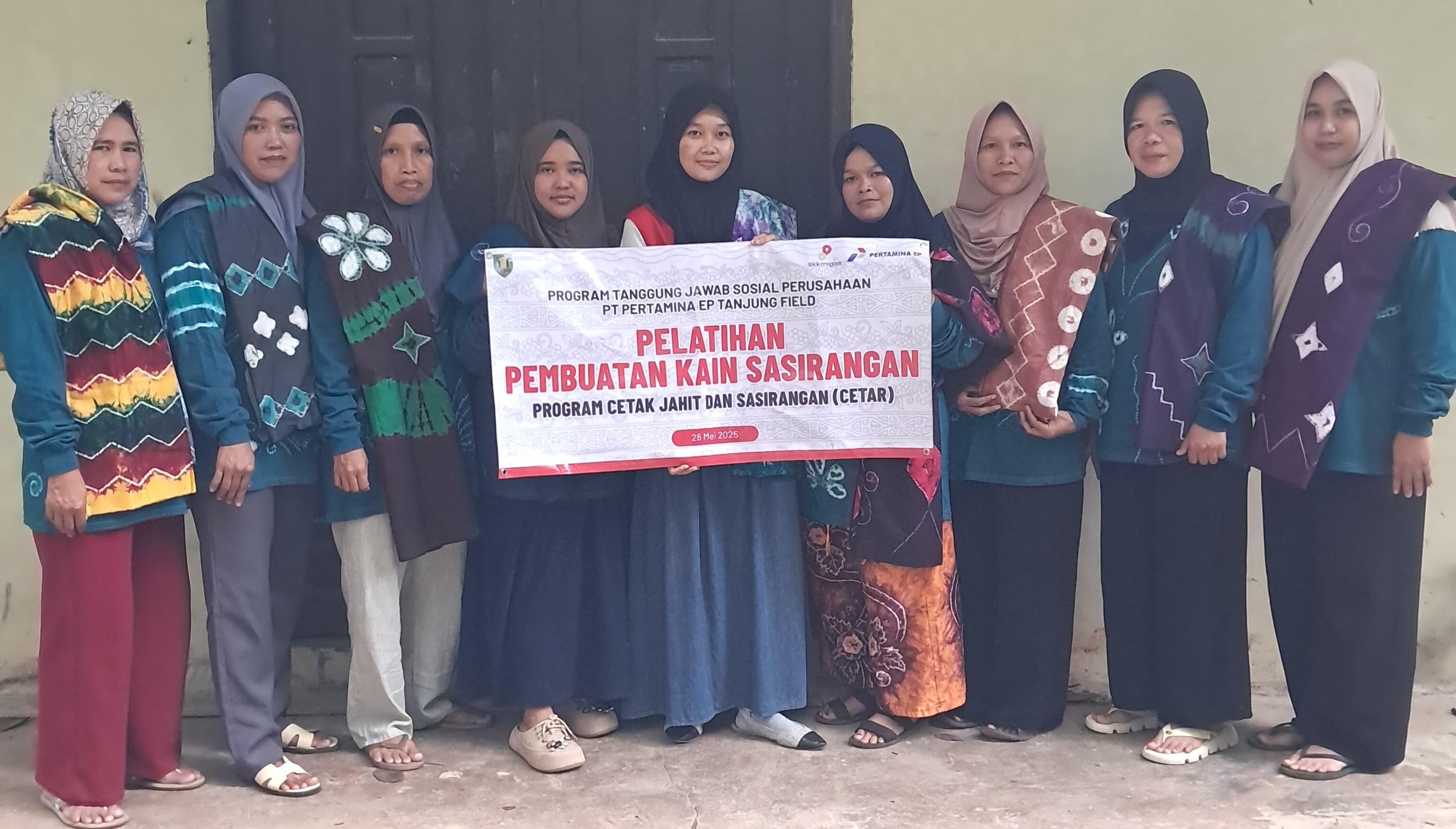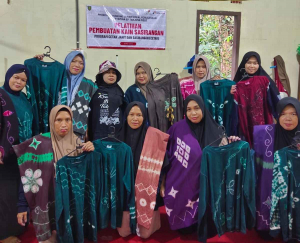17
Jul

Masukau, South Kalimantan – PT Pertamina EP (PEP) Tanjung Field, in collaboration with Madani MSMEs, held a training on making Sasirangan cloth, a traditional Banjar Tribe cloth, in Masukau Village, Murung Pudak District, Tabalong Regency, South Kalimantan, from May 26 to June 1, 2025. The activity aims to transfer knowledge and skills in Sasirangan cloth-making techniques, thereby supporting the preservation of culture and the development of creative economic potential in the village.
For Madani MSMEs, the ability to produce their Sasirangan cloth is a strategic step in strengthening their business lines. In addition to its high economic value, Sasirangan cloth can serve as the primary raw material to expand the variety of craft products, including the development of new products such as sheet fabrics and t-shirts with distinctive motifs.
PEP Tanjung Field Field Manager Charlie Parmonangan Nainggolan expressed his appreciation for the collaboration between the Company and Madani MSMEs. He stated that this collaboration will ensure the program's success and sustainability, thereby enhancing its impact on the community. "In implementing community development programs, the Company collaborates with MSMEs and other stakeholders to ensure the positive impact and sustainability of these programs," he said.
Charlie stated that the training is expected to boost the community's economy and independence through the sustainable utilization of local creative economic potential.
Ermawati, a member of the Madani MSMEs, expressed her appreciation to Pertamina PEP Tanjung Field for its ongoing support of her group. "With this training, we can improve our skills in other areas, not just sewing. We now understand how to create Sasirangan motifs and how to combine colors. Thank you to Pertamina for supporting us, allowing us to develop," said Erna.
The Head of Masukau Village, Khairullah, also expressed his appreciation to PEP Tanjung Field and supported the Sasirangan cloth training program. "Thank you to Pertamina EP Tanjung for the Sasirangan training provided to our residents through the Madani Group in Masukau Village. We, the Masukau Village Government, fully support the development of the Sasirangan Sewing and Printing Program to improve the community's economy," said Khairul.
The Sasirangan cloth-making process consists of nine stages. At each stage, participants receive not only technical explanations but also the opportunity to practice the techniques themselves. The initial stage begins with an introduction to the raw materials and equipment used, followed by the process of creating a pattern on thick cardboard that will serve as a print for the fabric.
The fabric is then patterned and sewn using a basting technique to create creases, which will form a distinctive pattern during the dyeing process. After the dyeing and drying stages, the basting thread is removed, allowing the pattern to be fully visible. The process concludes with cleaning the fabric until it is ready for use or further processing.
In addition to producing various crafts from Sasirangan cloth, the Madani MSMEs also utilizes used work clothes (coveralls) belonging to Pertamina workers to create a range of value-added products, including hats, waist bags, tote bags, sling bags, and ready-to-wear clothing.
Meanwhile, Dony Indrawan, Manager of Communication Relations & CID PHI, explained the company's commitment to continuously implementing various innovative and sustainable Corporate Social Responsibility (CSR) programs. "Utilizing regional potential based on the results of social mapping as solutions to the needs or problems faced by the community makes this program have a real impact on the community, as we hope from this training," he said.
According to Dony, this Sasirangan cloth-making training is a good first step in building the capacity of the Masukau Village community to increase their productivity and produce products with economic value.
Dony believes that the synergy between companies, MSMEs, and the Masukau Village community, as developed through this training, will lay a strong foundation for creating an inclusive and sustainable creative economy ecosystem. "This collaboration reflects the active role of the business community (companies) in supporting the independence of local communities through a participatory approach based on regional potential," he concluded.
PT Pertamina EP (PEP) Tanjung Field is part of Zona 9 Subholding Upstream Regional 3 Kalimantan, which is managed by PT Pertamina Hulu Indonesia. Through collaboration with SKK Migas, PEP Tanjung Field implements innovative Corporate Social Responsibility programs in the areas of Economics, Education, Health, Environment, Infrastructure, and Disaster Response to support sustainable community empowerment and the achievement of Sustainable Development Goals (SDGs). PHI is headquartered in Jakarta. Further information about PHI-Regional 3 Kalimantan is available at https://phi.pertamina.com.
